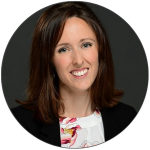 Director of Journals, American Society of Clinical Oncology
Director of Journals, American Society of Clinical Oncology
Please tell us a bit about yourself (e.g., hometown, current locale, course of study).
I was born and raised in Northern Virginia and still live there now, which is somewhat unusual, given that the area is highly transient. I love living near Washington, DC. There is so much history, tons of fun things to do, and all the Smithsonian museums are free!
All I ever wanted to do as a kid was read, so I always knew I would go into a profession that involved publishing in some way. I got my bachelor’s degree in English from Mary Washington College and my master’s in Publishing from George Washington University. When I’m not working, I spend time with my husband and kids. I still love to read. I also knit, cook, and find ways to stay physically active, like running.
Describe some of your current responsibilities and what type of organization you belong to.
I am currently the Director of Journals at the American Society of Clinical Oncology. In this role, I oversee the editorial aspects of our five journals, which are a mix of well-established and somewhat young publications, open access and hybrid, print and online.
What was your first scholarly publishing role? How did you get that job? What path led to your current position?
My first “job” in publishing was getting some friends together to write the advice column in our middle school newspaper. Does that count as scholarly publishing? Probably not. In high school, I was an editor for the school newspaper, a role I loved and took very seriously.
After college, I still didn’t quite know what I wanted to do with my degree. However, I had earned a certification to teach English, so that was what I did while I was figuring things out. I ended up teaching English and History at the middle school level. I knew that teaching was not going to be my career choice, but I did enjoy it for several years.
When I was ready to move on, I went about it the old-fashioned way, by circling job ads in the newspaper. (I think I just dated myself.) One such ad was for an editorial assistant at the American Society of Clinical Oncology. I didn’t know anything about oncology, but the job sounded interesting, so I applied. I ended up getting the offer, and on my birthday, no less. What a gift that turned out to be. That editorial assistant position allowed me to get my feet wet within publishing, and I was so excited to finally figure out what I wanted to be when I grew up.
If there was a pivotal moment or key person in your career development, please describe briefly.
The pivotal moment was definitely being offered that job at ASCO. I had no experience within publishing, so they really had to take a chance on me. But from there, I was able to learn a lot, and I happened to be in the right place at the right time more than once, which allowed me to move up into new roles. I have spent my entire publishing career at ASCO, moving from editorial assistant to coordinator to managing editor and now director. I was so lucky to have a great manager who afforded me every professional opportunity, believed in me, and encouraged me to continue to learn and grow. Without him, I don’t think I would have pushed myself as far as I did, and I certainly would not be where I am now.
What tools, websites, and organizations do you find most valuable for your career development?
I am on the board of directors of CSE and also rely on SSP, ISMTE, and similar organizations to keep up with the latest in publishing. I also read The Scholarly Kitchen. I find their content so timely and relevant. It’s a great way to keep up with the publishing community.
Beyond those formal channels, you can’t beat the power of networking. I’m so grateful for organizations like SSP and CSE that have been the mechanism for me to meet so many people within publishing. Those relationships have helped me grow by providing opportunities to meet other publishing professionals, and tap into their wealth of knowledge. I love being able to ask questions when needed and learn from the experience of others.
What advice would you give to people interested in a career in scholarly communications?
Take every opportunity to learn. Make the most of working on every project offered to you, even if it seems intimidating at first. Ask questions. Don’t stop learning.

